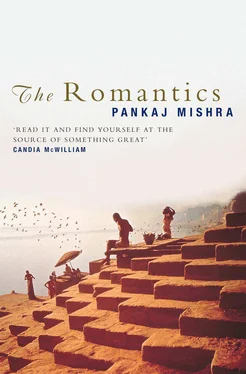Before I could even think of saying something, she had proposed a boat ride in the evening. ‘I haven’t done it for ages,’ she said. ‘Will you come? You should do it at least once to get a feel of the city.’
I said yes. I never went out on such excursions on my own; the city was still an unexplored place for me.
Miss West had her own favourite boatman: his name was Ramchand and he came running up the steps as soon as she and I appeared on the ghats that evening.
He was a strikingly handsome man with beautifully sculpted muscles on his lean, chocolate-brown body, most of which was bare, his only item of clothing being a dhoti, which he wore like a G-string, tightly wound round his hips and buttocks. He held his palms together before Miss West; he bowed his head; he looked eager to serve. Miss West, speaking to him in broken Hindi, inquired after his health and family; she asked about the house he was building for himself as he led us to his boat, a ramshackle affair of nailed-together planks lying still on the black, scummy water.
She brought an un-Indian naturalness to her exchange with the boatman, and watching her, I felt a trifle awkward. Although I spoke the same language as Ramchand and lived in the same country, the scope for conversation between us was limited. Countless inhibitions of caste and class stood in our way; the only common vocabulary between us was of the service he offered.
‘He’s quite dishy, isn’t he?’ said Miss West as we got into the boat, and Ramchand began to disentangle the ropes that tied it to the iron picquet on the muddy bank.
I was too embarrassed and flustered to respond; the word ‘dishy’ was new to me, but it wasn’t hard to guess at its meaning.
‘Back in England, he’d be a film star, or at least a model,’ Miss West said. And then after a short pause she added, ‘But you don’t go for men. I know that. I noticed you gawking at Catherine that evening. Tell me,’ she asked in that sharp demanding tone of hers, ‘do you like her?’
This embarrassed me further. There was so much here that was weird and unfamiliar: women commenting on the physical allure of men, particularly men socially inferior to them; the notion that I could ‘like’ men in that way. What seemed worse (for it was partly true) was that I would be so taken by Catherine in that brief meeting that other people would notice the change in my demeanour.
I mumbled something about Catherine being ‘nice’ and was relieved when Miss West didn’t ask me any more uncomfortable questions about her.
Instead, she said, ‘Poor girl. How badly she needs to be loved. She’s obsessed with Anand. She thinks of him as the next Ravi Shankar. But I wonder how long that will last. I don’t think he can give her the stability she needs. He’s too dependent on her.’
I thought: but hadn’t she herself said that they were very much in love? These second thoughts of Miss West’s perplexed me at first. But they also sounded truer; and I acknowledged these new facts of Catherine’s relationship with Anand with the sudden thrill that accompanies the truths that in some unconscious way matter deeply to us.
Soon we had moved away from the ghats, Ramchand pulling at the oars in a slow graceful motion, the varied sounds of the city becoming a steady background hum to the soft plop-plop of the oars against the water.
We passed a few fishing boats anchoring themselves for the night, their tattered sails fluttering against the soft breeze blowing in from the other bank. On Harishchandra Ghat, among piles of wooden logs and mounds of swept-up ashes, there was a lone burning pyre, and the grieving friends and relatives of the deceased stood motionless around it. At Kedar Ghat, the piercing oboe-like sounds of shehnai from a wedding procession travelled over the water in brief gusts. Up ahead in the far distance, a train rattled across the Dufferin Bridge, its windows flashing the last of the day’s sunlight.
My mind was still a mess of confused thoughts about Catherine and Anand when Miss West said, ‘There, that’s Mark’s house, just above the Shiva’ — she pronounced it Sh-ee-va — ‘temple, with the iron-barred windows. Do you see it?’
I looked in the direction she had pointed at, but it was too dark to distinguish the house from the mass of grey masonry in which it was embedded.
Miss West said, ‘Such a nice chap, but so American. So over-sincere about everything he does. He’s taken up with that perfectly ordinary girl, Debbie, and thinks the world of her.
‘What he wants to do is get home,’ Miss West went on. The light was almost gone and I couldn’t see her face. But the voice still travelled through the darkness in sharp, clear bursts. ‘He’s sick of gadding about the world. And so he’s gone and fallen for the commonest American he could find here. A perfect example of poshlust — do you know the word? It’s Russian, absolutely brilliant, it stands for commonness, banality, smugness, all together. She gets her parents to send her videos of David Letterman , she misses her dog, all she wants to do in Benares is sunbathe and get a great tan, and then she says she wants to convert to Buddhism. It doesn’t make sense.’
She was silent for a while and I tried to guess who or what David Letterman was. Miss West turned to talk to Ramchand; she asked him to take us to Narad Ghat. The evening sounds of the city — conch shells, temple bells — began to reach us as we rowed towards the bank. The water shimmered with the broken reflection of the huge sodium lamps looming out from behind the ramparts.
Miss West tipped Ramchand generously. He bowed his head low in appreciation; that eager expression came back to his face. As he walked away from us, through a row of flower and coconut sellers, he fell in with a friend he had greeted while coming up the steps from the river with us. His manner changed immediately. His shoulders lost their supplicant’s stoop. I saw him point his thumb in our direction and laugh, his teeth white against the dark brown skin of his face.
Later, walking through the dark alleys, a party of jovial pilgrims from Tamil Nadu ahead of us, I asked, ‘Where’s Debbie from?’ It was the question I was accustomed to ask people in India. The answers usually helped put their backgrounds in sharper focus.
‘Debbie?’ Miss West echoed. ‘She’s from Providence, Rhode Island. A perfectly vile place.’
I tried to find Rhode Island on a mental map of America. I had heard about the provinciality and backwardness of Oklahoma and South Carolina. But Rhode Island? The name brought up no associations in my mind. I tried to visualize Providence to myself, and speculated about the reasons for it being so, in Miss West’s word, vile.
Miss West couldn’t have guessed at the degree of uncertainty her remarks induced in me. They made me overturn all the notions I had formed so far. ‘He’s so American. So over-sincere,’ she had said. Were Americans over-sincere as a rule? Such generalizations lay beyond my limited knowledge of the world; they made me feel ignorant. And they made Miss West herself seem a repository of bits and pieces of odd wisdom.
I had no means of assessing on my own the character and background of people I had met at Miss West’s party. Mark had appeared solid to me; the eventfulness of his life, the various careers — it all suggested a substantial endeavour. Miss West’s remarks made him seem different, someone much less certain of himself, and drifting from place to place, from one second-hand idea to another. It was the same with Debbie. The bits of dialogue with Sarah I had overheard at the party, her interest in converting to Buddhism, had intrigued me. The idea of conversion lay so far from anything in my experience; such an effort of the will and intelligence it seemed to imply, such a depth of dissatisfaction with the conventions of one’s society. But when I now thought of Debbie, I remembered best her quick nervous giggle and ill-fitting sari, and I tried to see in them signs of the commonness Miss West had spoken of.
Читать дальше












